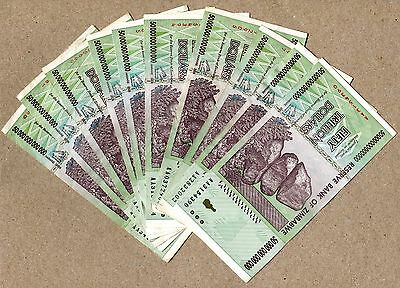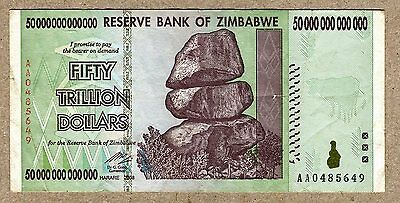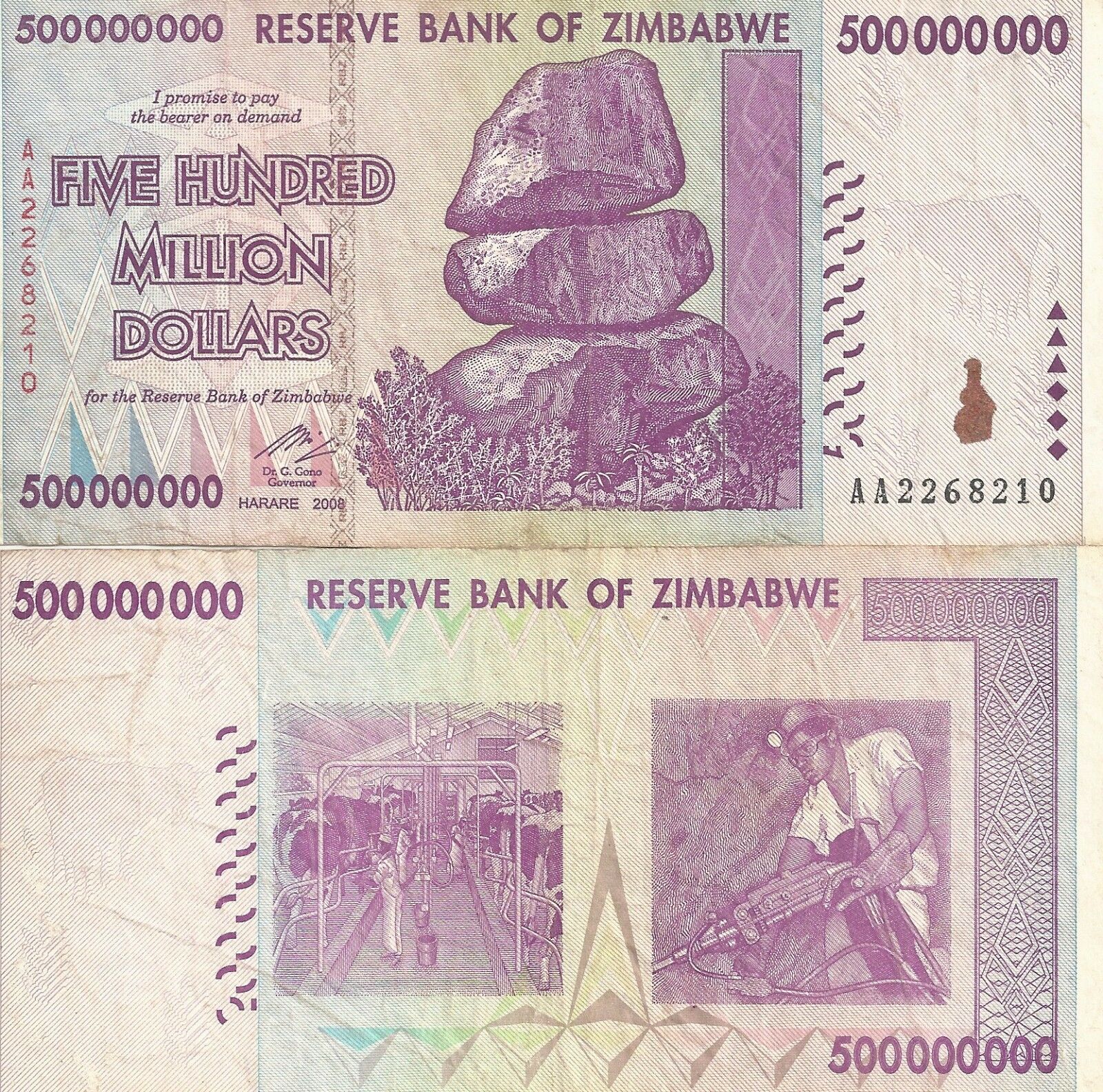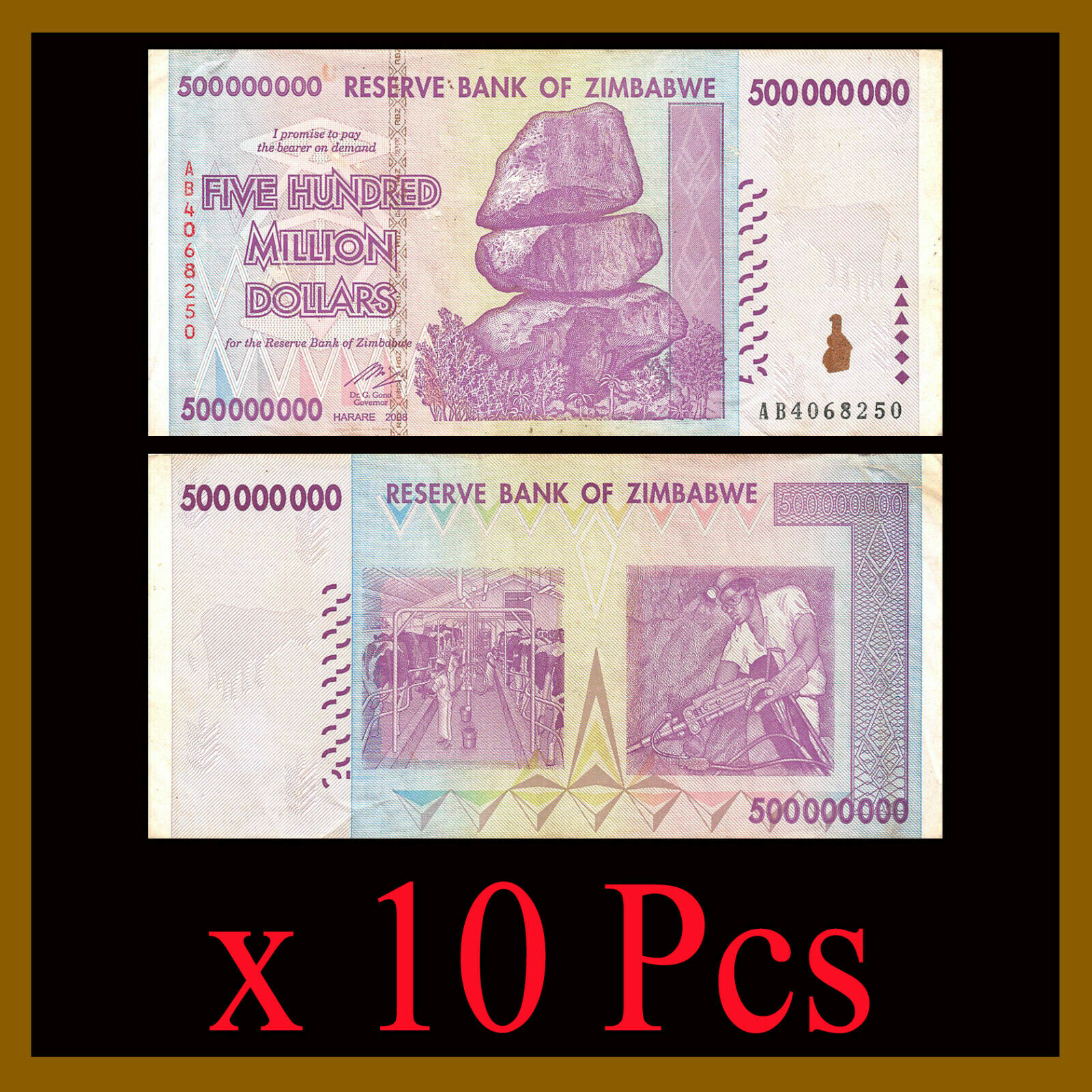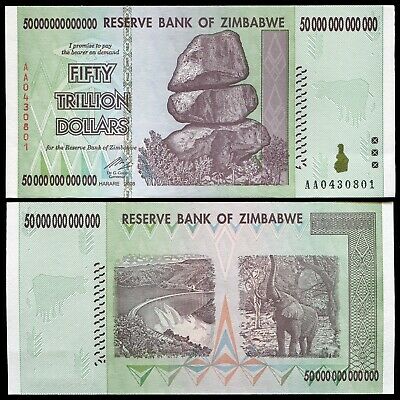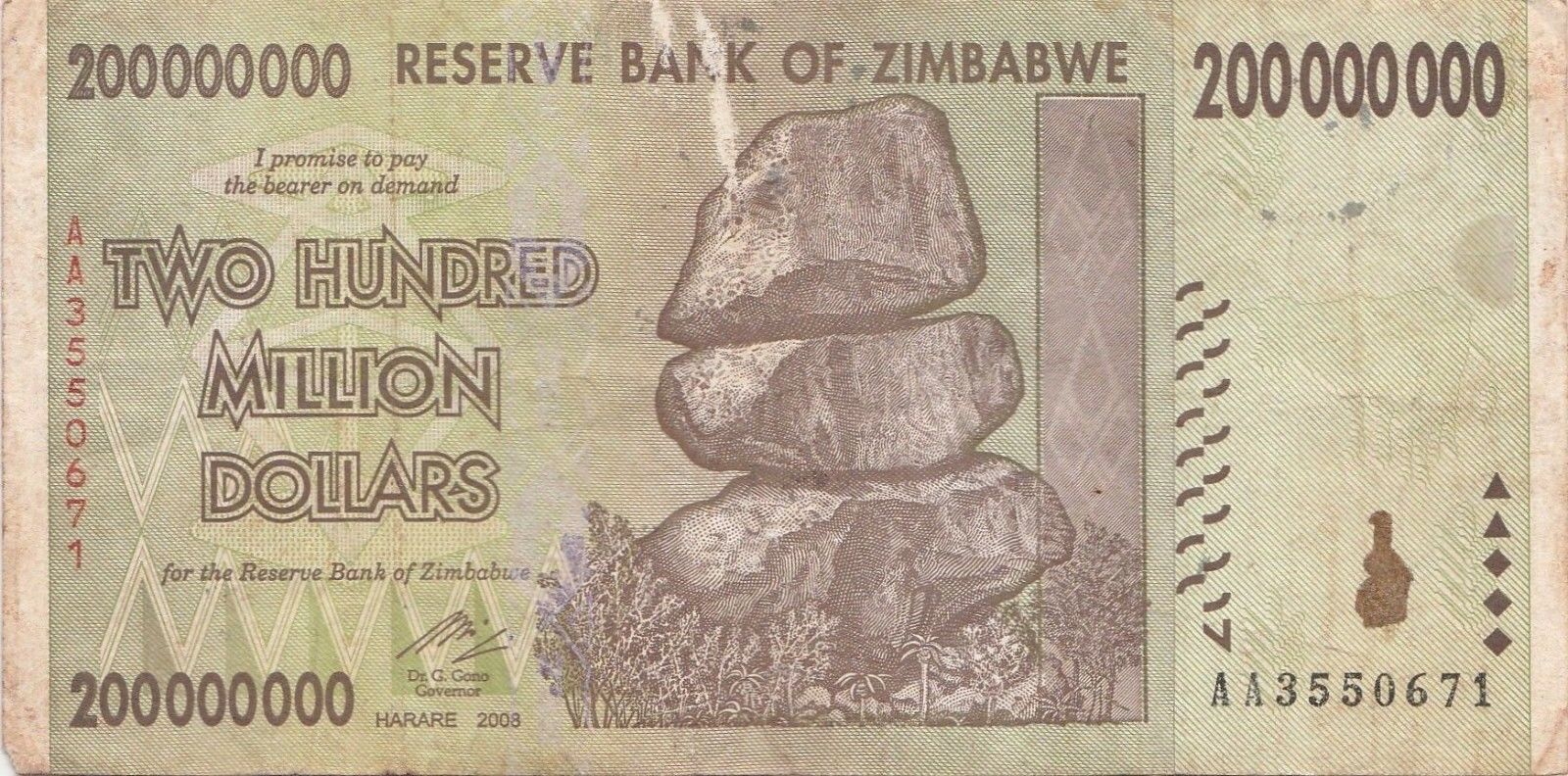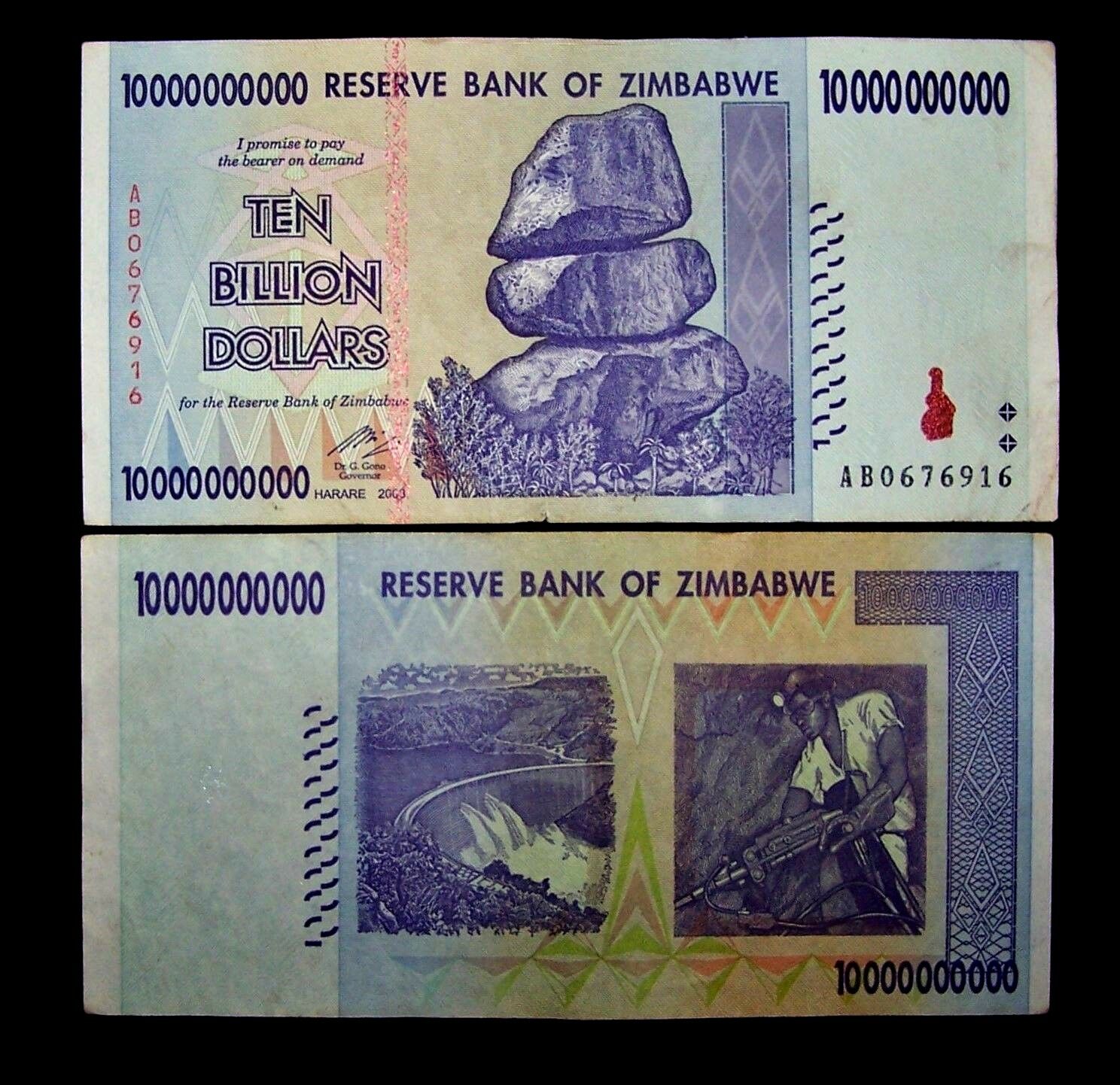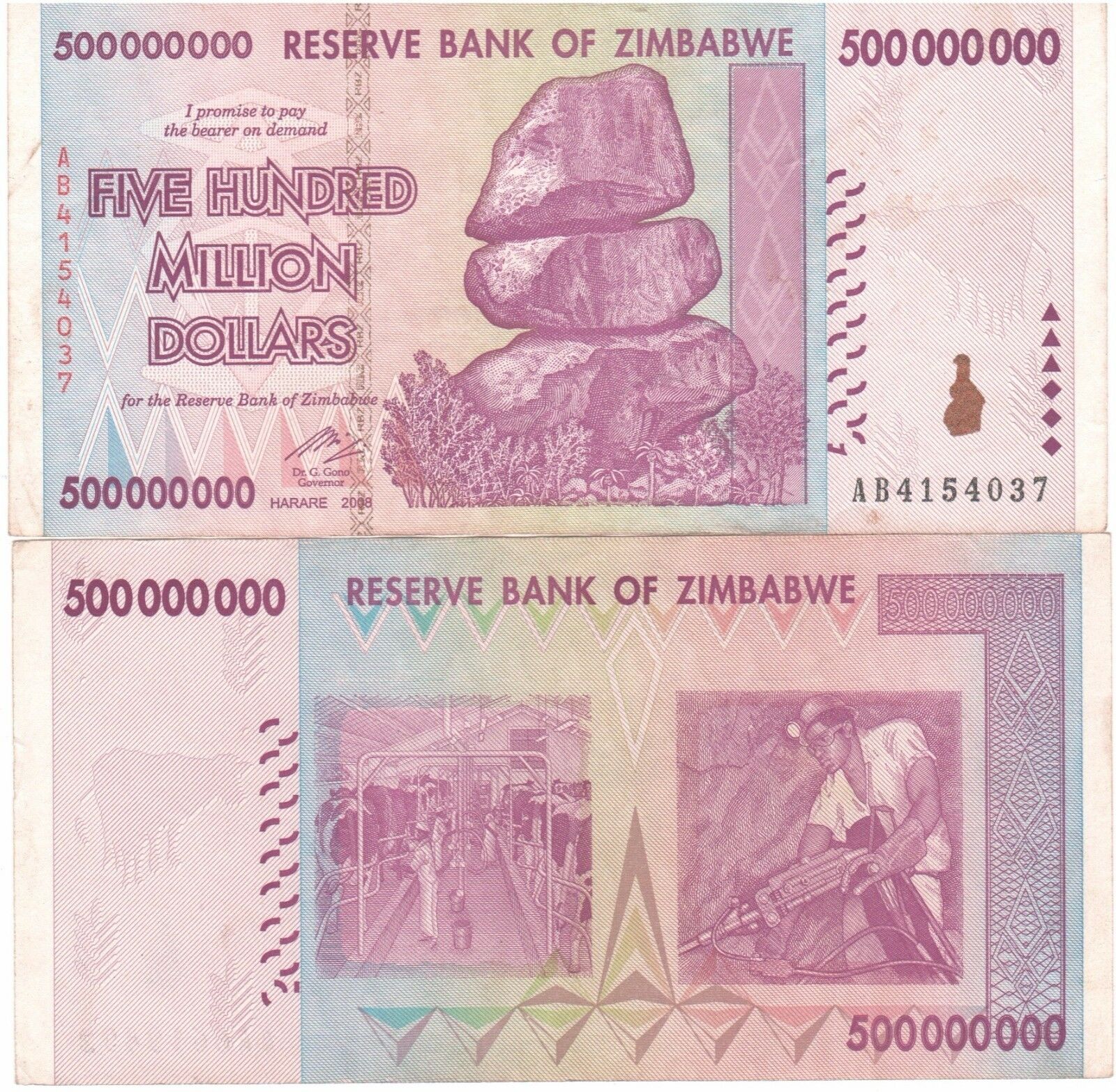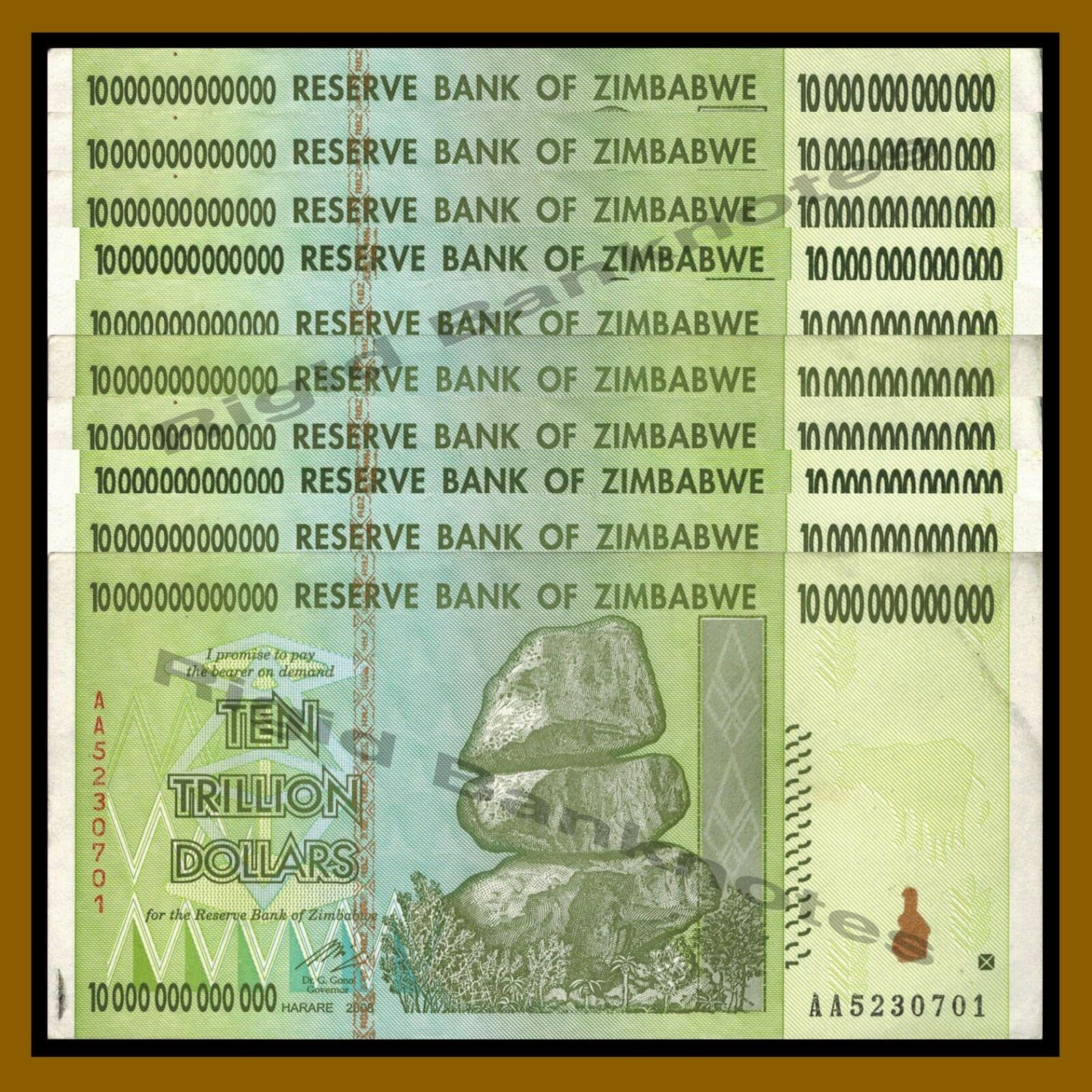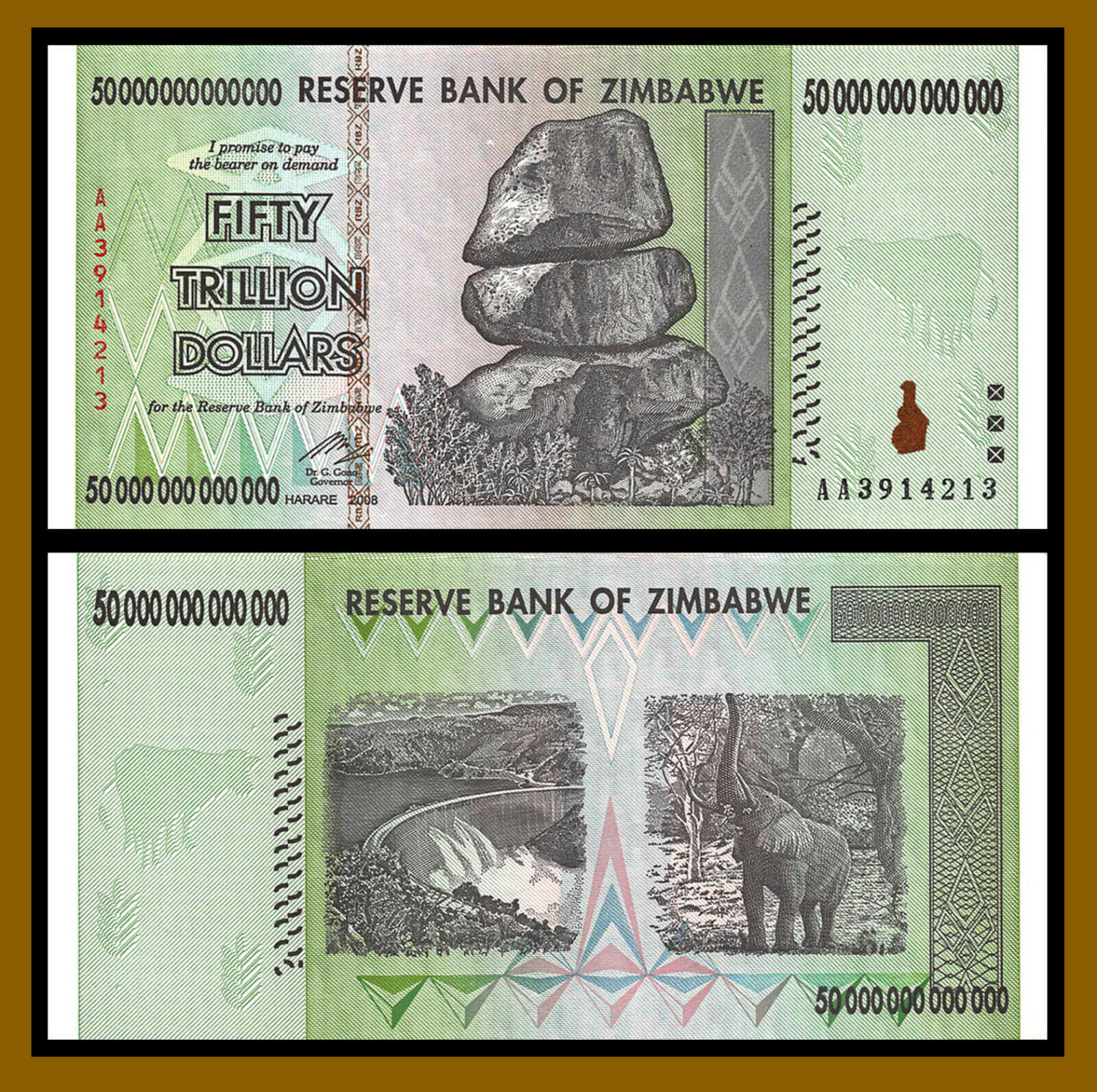-40%
Zimbabwe 50 Trillion Dollars x 10 pcs AA 2008 P90 VF currency bills
$ 366.96
- Description
- Size Guide
Description
These rare hyperinflation banknotes, issued for the Reserve Bank of Zimbabwe in Harare, are currently out of print and withdrawn from circulation.Please note: this is a stock image. The banknotes you receive may have different serial numbers to the banknotes pictured.
All bills come
secured between the solid sheets of corrugated cardboard in a padded envelope.
Banknote grading terms we use
UNC - Uncirculated
perfect condition, never used.
AU - About uncirculated
,
a
virtually perfect note, with some minor handling.
EF -
Extremely fine
, some weak folds or creases or one strong fold. Sharp edges of the bill might be slightly rounded.
VF -
Very fine
, might have some folds, but the note should still be crisp and has a very little amount of stains.
Shipping & Delivery
Payment
:
PayPal is preferred as the method of payment. Items will be shipped to your registered PayPal address.
Handling time:
We ship worldwide from Lithuania, Europe. Items are normally shipped the same business day or within 24 hours at the latest after receiving the cleared payment,
excluding weekends and national holidays. Purchases made after business hours, weekends and holidays will be processed the following business day.
Shipping fees:
Shipping cost is . Shipping price
is
calculated automatically during checkout.
You can also choose UPS express delivery option at an additional cost during checkout. UPS delivery time is 2
–
5 days.
Delivery:
buyers in the U.S. should expect delivery within 5–20 business days; buyers in Europe should expect delivery within 5
–
10 business days.
Returns &
Refunds:
if you are unsatisfied with your purchase, please contact us within 30 days of receipt of shipment.
Items must be returned in original condition at the buyer’s expense. We guarantee a replacement or a 100% refund.
Should you need to place an order of larger quantity or offer your price other than indicated in our listing,
please do not hesitate to contact us by Ebay messages.
History of Hyperinflation in Zimbabwe
Hyperinflation occurs whenever a country’s currency is created at too high of a rate. The money eventually loses its power and value, as it is too overabundant. The history of Zimbabwe’s hyperinflation is a lengthy one, and it revolves around a government that slowly became derailed.
Originally, the Zimbabwe dollar held high value. In fact, dating back to its origin in the 1980s, the Zimbabwe dollar held more value than the U.S. dollar. The early years of Zimbabwe’s economy saw great growth and development. Various industries and crops were thriving, and, thus, Zimbabwe’s economy had begun to thrive as well.
However, the tables began to turn under the reign of President Robert Mugabe. In the early 1990s, Mugabe, with the help of the World Bank, decided to create an Economic Structural Adjustment Program. This ESAP would begin the gradual fall of Zimbabwe’s currency.
As a result of this readjustment, the government forced various land redistribution and land reform. Not only would this shift in land reform contribute to the fall of the economy; many claim that Mugabe’s actions were racist. Mugabe’s government took away land from white farmers and redistributed it to black farmers as an act of correcting the injustices done by colonialism. What Mugabe’s government did not know is that many of these black farmers were not prepared to tend to the new land, and thus many crops and industries began to plummet.
Once these various crops and industries began to fall, the rest of the domino effect began. The banking sector collapsed as soon as the farmers were not able to receive loans. The food output rate fell by almost half of its percentage, and therefore manufacturing rates also declined. Ultimately the unemployment rate rose to a startling 80%, and the life expectancy rate dropped.
All of these awful consequences affected the monetary value of Zimbabwe currency for a few different reasons. Simultaneously with the steady decline in life at home, the Mugabe government was rapidly producing money to fund their efforts with the Democratic Republic of the Congo and the Second Congo War. The government did not honestly report their spending to the International Monetary Fund, so there was no record of the imminent doom facing the country.
In addition to the war efforts, there were a few other causes for the eventual hyperinflation of Zimbabwe currency. Due to the corrupt government, many officials were being overpaid, and people were not confident in their government’s abilities. This unfaithful feeling towards a country’s government has the tendency to undermine the faith of currency.
The Timeline of Zimbabwe’s Currency Hyperinflation
Follow this timeline for insight into the amount of time it took for Zimbabwe’s currency to crash.
April 1980
The very first Zimbabwean dollar is created in order to replace the Rhodesian dollar. A series of Zimbabwe bank notes are issued. These denominations range from to .
1994
–
2006
The Reserve Bank divvies out many different banknotes ranging from to 0. Once inflation begins to hit the country’s economy, the currency begins to lose its power, and therefore the 0 and ,000 are issued between the years of 2001 to 2005. By 2006, Zimbabwe welcomed the introduction of the ,000 and 0,000 banknotes.
August 1, 2006
The government begins to attempt a currency reform in order to cease the inflation. The new denomination of the Zimbabwe dollar eliminates three zeros from the old dollar; therefore, the second Zimbabwe dollar is revalued at one dollar, which would be ,000 in the old currency.
July 1, 2007
Approximately one year later, the government creates the 0,000 banknote. According to the official exchange rate, this extremely large Zimbabwe currency was worth around .00 in U.S. dollars.
December 31, 2007
As the year comes to a close, the government issues the 0,000 banknote. This currency was worth approximately .00 in U.S. currency.
January 1, 2008
The next day, the government introduces the Million, Million, and the Million.
April 2, 2008
The Million and Million banknotes are debuted. Here are a few prices that were commonly seen during this time: one T-shirt would cost around 6.5 Million and a pair of paints could run for .65 Billion. Local produce sold in the Millions, and two beers and one bottle of water would cost you around Billion.
May 2, 2008
Annual inflation now reaches over 100,000%, and the 0 Million, 0 Million, and 0 Million banknotes are introduced.
May 15, 2008
A few days later, the Billion, Billion, and Billion bearer banknotes are debuted.
July 1, 2008
On this day, the 0 Billion note is introduced, and this bill would buy anyone approximately three eggs.
August 1, 2008
The government now implements another attempt at currency reform by eliminating ten zeroes from every Zimbabwe dollar. The third Zimbabwe dollar is now worth 10 Billion old dollars—the second Zimbabwe dollar. However, despite this new implementation, inflation continues to rise.
September 29, 2008
The new ,000 and ,000 notes are debuted.
October 13, 2008
The new ,000 note is issued.
November 5, 2008
The 0,000 and 0,000 bills are printed.
December 4, 2008
The government issues the
Million
,
Million
,
Million
, and the
0 Million
dollar banknotes.
December 14, 2008
Approximately ten days later, the government slowly issues the new banknotes of the
0 Million
and
0 Million
. Five days after this, the government issues the
Billion
,
Billion
and
Billion
bills.
January 12, 2009
The new
Billion
and
Billion
bills are introduced.
January 16, 2009
The government reaches new highs with the introduction of these new banknotes: the
Trillion
,
Trillion
,
Trillion
and even the
0 Trillion bill
.
February 3, 2009
The Reserve Bank of Zimbabwe takes over and introduces the fourth Zimbabwe dollar, which eliminates twelve zeros from old bills. This causes Trillion to equal one new dollar. The new denominations issued are: , , , , , 0, and 0; however, many begin to adopt foreign currency, such as the U.S. dollar and the South African rand. Zimbabwe currency is obsolete and no more in use.
